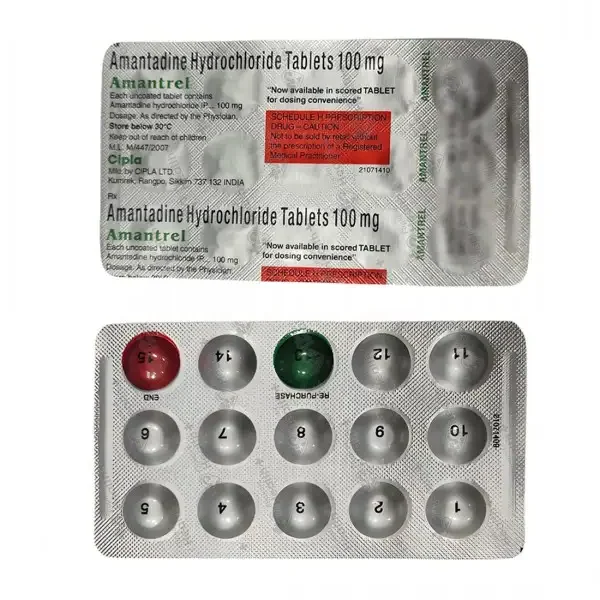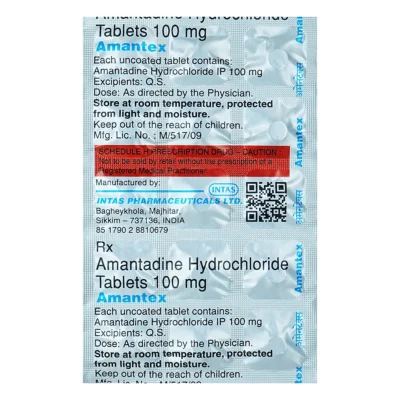💊 AMANTADINE 100 mg CAPSULE
Dual-Action Agent for Neurology & Antiviral Therapy
COMPOSITION:
-
Amantadine Hydrochloride 100 mg
(Oral capsule or tablet formulation)
WHAT IS AMANTADINE 100 mg?
Amantadine 100 mg is a multifunctional medication primarily used in the management of Parkinson’s disease and drug-induced extrapyramidal symptoms. It also has antiviral properties, particularly against influenza A virus. Amantadine acts on the central nervous system (CNS) and viral replication mechanisms, offering unique dual therapeutic applications.
MECHANISM OF ACTION:
Amantadine works through two main pathways:
-
Neurological Effects:
-
Enhances the release of dopamine from presynaptic terminals.
-
Blocks NMDA (N-methyl-D-aspartate) receptors, modulating glutamate transmission.
-
Reduces Parkinsonian symptoms such as tremor, rigidity, and bradykinesia.
-
-
Antiviral Action:
-
Inhibits the M2 protein of the influenza A virus.
-
Prevents viral uncoating, halting replication within host cells.
-
Has limited use today due to widespread resistance among influenza A strains.
-
INDICATIONS:
-
Parkinson’s disease (monotherapy or adjunct to levodopa)
-
Drug-induced extrapyramidal symptoms (e.g., from antipsychotic medications)
-
Prophylaxis and treatment of influenza A (when susceptible strains are confirmed)
-
Fatigue in multiple sclerosis (off-label use in some settings)
DOSAGE & ADMINISTRATION:
-
Neurological indications:
-
Adults: 100 mg once or twice daily (max 200 mg/day)
-
Dose adjusted based on age, renal function, and tolerability
-
-
Antiviral use:
-
Adults: 100 mg twice daily for 5–7 days
-
Elderly or renal impairment: Reduce to 100 mg once daily
-
Take with or without food. Swallow capsule/tablet whole with water.
KEY BENEFITS:
✅ Dual action: neurological and antiviral
✅ Reduces Parkinson’s symptoms and drug-induced tremors
✅ Useful as adjunct therapy in early Parkinson’s disease
✅ Can help manage fatigue in neurological conditions (off-label)
PRECAUTIONS:
-
Use caution in patients with:
-
Seizure disorders
-
Congestive heart failure
-
Liver or kidney impairment
-
History of psychiatric illness
-
-
Dose must be adjusted in elderly and those with renal impairment
POSSIBLE SIDE EFFECTS:
-
Common: Dizziness, dry mouth, nausea, insomnia, anxiety
-
Occasional: Livedo reticularis (mottled skin discoloration), edema
-
Rare: Hallucinations, confusion, agitation, urinary retention, orthostatic hypotension
CONTRAINDICATIONS:
-
Known hypersensitivity to amantadine
-
Untreated angle-closure glaucoma
-
Severe renal impairment (without dose adjustment)
STORAGE INSTRUCTIONS:
-
Store at room temperature (15–30°C)
-
Protect from light and moisture
-
Keep out of reach of children
DISCLAIMER:
This summary is for educational purposes only. Always consult a qualified healthcare provider before starting or discontinuing any medication. Amantadine requires medical supervision, especially in neurological or elderly patients.



Reviews
There are no reviews yet.